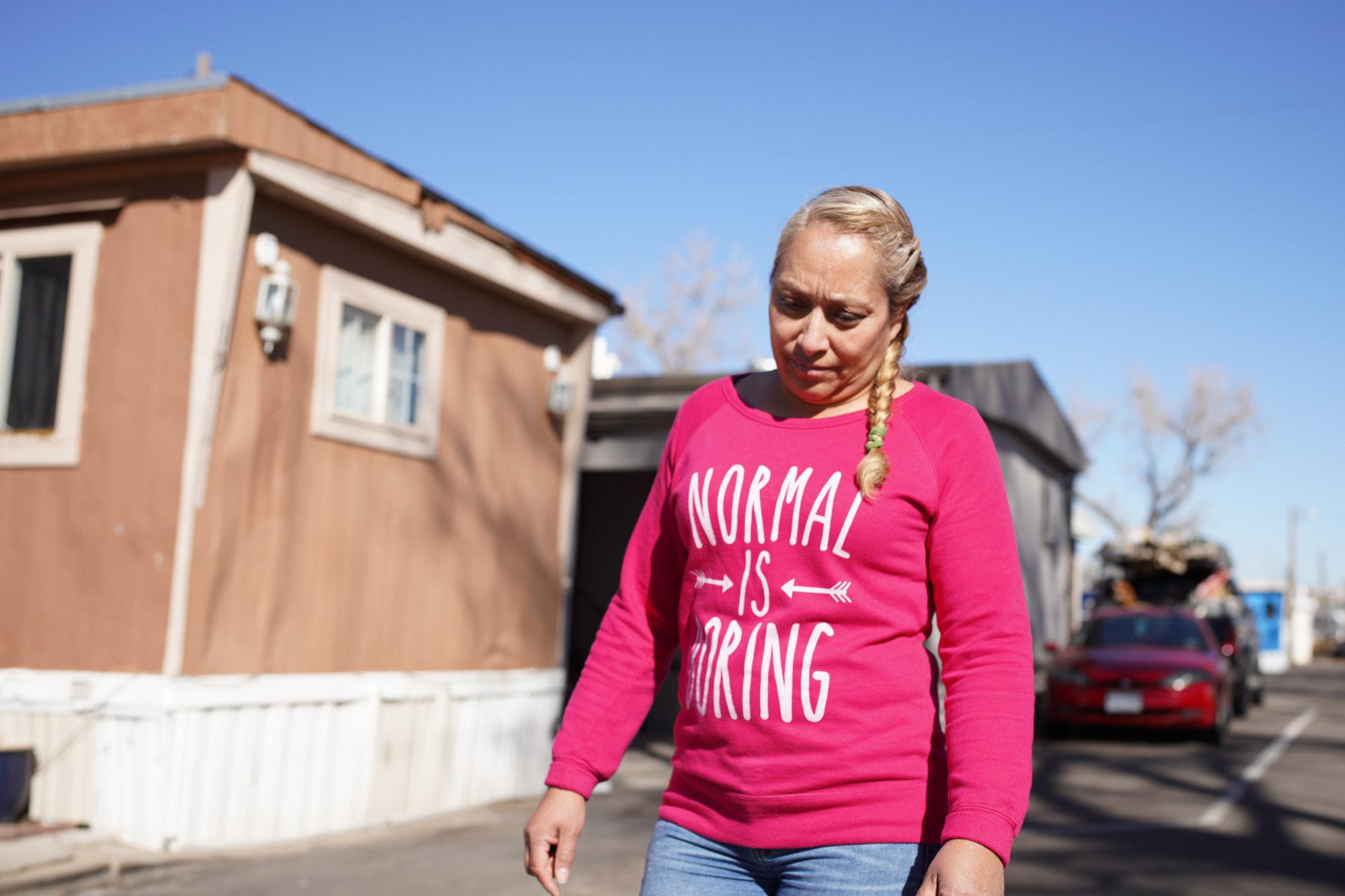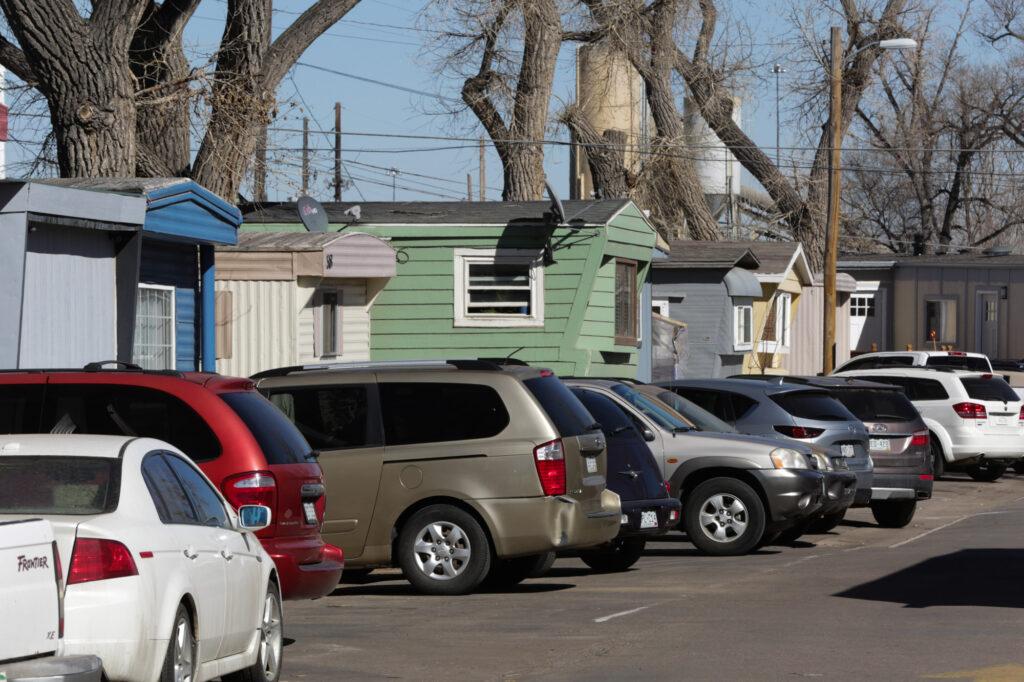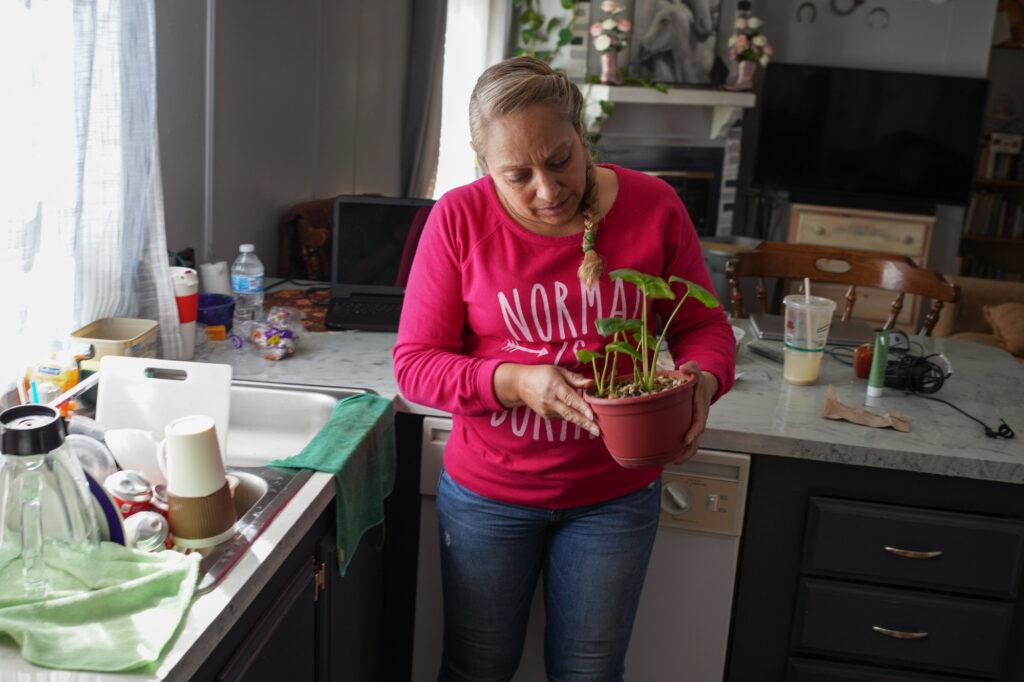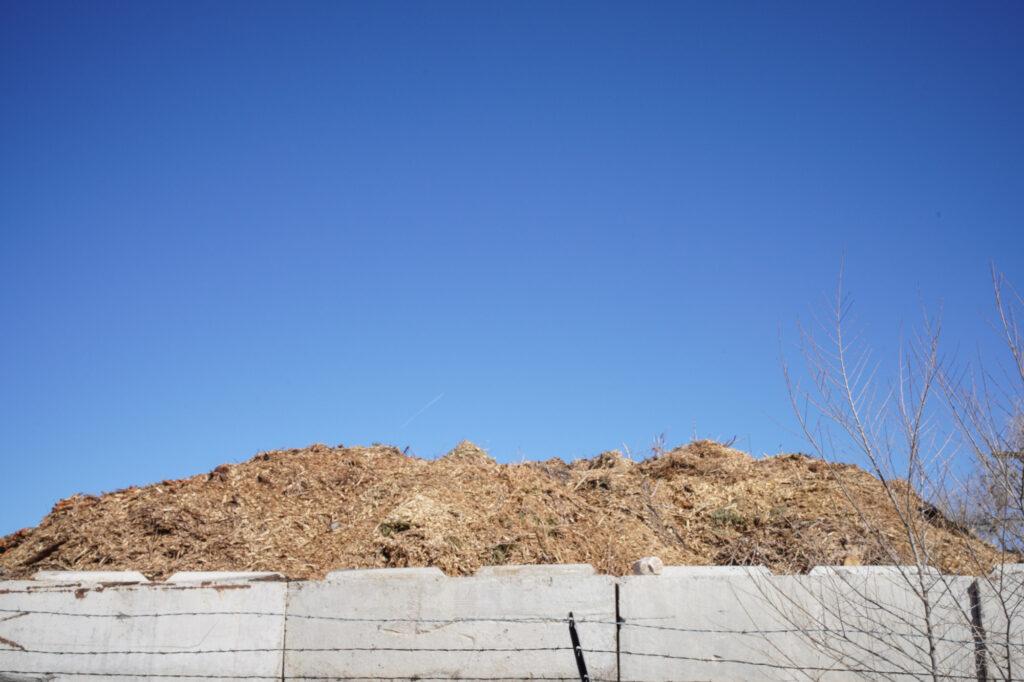
At Elevado Estates Mobile Home Park in Arvada, kids tumble off the bus after school with musical instruments and backpacks, and return to flimsy metal homes like the one Lucy Guereca, 47, lives in with her husband and two kids, sandwiched between a sanitation center and a smelly composting plant.
When Lucy turns on the water, it’s brownish.
“The taste of the water is totally different,” she says through Luz Galicia, a housing organizer with 9to5 Colorado, an organization focusing on work/family issues, affordable housing, and workplace equity. “Every morning I run the water until it gets clear.” As far as she is concerned, it’s undrinkable, so she spends $100 on bottled water each month.
It’s not her only expense. Guereca pays $900 a month for lot rent, which went up twice during the pandemic. The only obvious improvement that occurred in the park’s common areas were the new decorative rocks by the entrance. And she got a note from the owner telling her she’d get fined if she parked in the visitors’ lot. Smells from the compost plant – which the owner claims are not so bad – permeate her walls and make her carne adovada taste, in her view, atrocious.
A bill passed Tuesday by the Colorado legislature could offer some help to residents like Guereca.
What the new law would do for mobile home residents
The legislation, now on its way to Gov. Jared Polis, would require owners to take better care of common areas and utilities such as the water. It would give park residents 120 days to purchase their parks should they be put up for sale. Local governments would also have the right of first refusal on sales. Additionally, it requires mobile home park owners to compensate lot renters for the cost of moving homes, if the park is converted to a different use.

If signed into law, it will give Guereca and her family a better chance at getting some improvements to the water, and perhaps some fencing to keep compost particles from flowing up to her door. But, it won’t curtail the regular rent increases her family faces. That’s because a key provision of the bill that advocates were hoping for – which would keep rents from rising more than 3 percent – was removed in response to concerns raised by Polis.
“We very much viewed lot rent stabilization as a way to protect residents against what have been some really egregious and unaffordable lot rent increases,” said Rep. Andrew Boesenecker, D-Fort Collins, one of the bill’s three sponsors. “Without those protections in place, obviously, those problems will continue, but we’re hopeful that the rest of the bill will provide some buffer and hope for residents.”
Residents say landlords have failed them
Families like Guereca’s, who’ve purchased a mobile home and then rent the land it is on, complain that they often find themselves stuck with landlords who don’t take good care of utilities and communal spaces on the property, and who raise rents with impunity, then don’t do anything with those rent increases to benefit residents.
About 100,000 mobile homes exist in parks that are spread around Colorado, offering affordable housing that, at the same time, residents say hold them hostage to rising lot rents and sub-standard amenities. Most cannot just up and leave, as the cost of moving mobile homes – those that could withstand it – is more than $10,000. The only answer is for residents to buy the park themselves when and if they can, a tricky process that has been successful for a handful of parks statewide, such as one in Durango that became self-owning last June.
It’s a national problem, according to Esther Sullivan, Assistant Professor of Sociology at University of Colorado Denver and author of "Manufactured Insecurity: Mobile Home Parks and America’s Tenuous Right to Place."
“The central issue is that we have low income home-owners; at the same time we have this irreplaceable source of affordable housing; we have it situated on land that the resident doesn’t own, doesn’t control, and it’s a captive population for the landlord, because it is difficult to move these houses,” Sullivan said.
Lack of rent control in new law hurts residents
The bill’s failure to protect residents from large rent increases stung the sponsors, who also included Rep. Edie Hooton and Sen. Faith Winter, as well as families who would have benefited from rent protection.

Sonia Sarabia’s was one such family. The 32-year-old former mobile home park resident had testified in favor of the bill in March, saying in an emotional voice that her mother, who has diabetes and rheumatoid arthritis, works as a house cleaner and lives in Orchard Grove Mobile Home Park in Boulder. During the pandemic, she lost customers, but at the same time, her lot rent went up to $850. To pay it, Sonia’s parents neglected health care costs. The result: Sonia’s mother got her right leg amputated.
“With every rent increase, it’s money we didn’t have to pay a bill or buy medicine. Every time we had to pay more, we didn’t have money to pay for health insurance,” she said.
Finding out the rent stabilization piece didn’t make it into the revised legislation was crushing. “I was frustrated, I was mad,” she said. “Because I see the struggle, not only of my parents, to pay the rent and everything, and I also see the struggle of so many families. If we look in the future, so many people are going to put having a roof over their shoulders before their health.”
More time to buy homes from landlord but weak track records of success
Still, the legislation, should it become law, will give lot renters in the state’s 718 mobile home parks a better chance to buy their parks if they go on the market. What remains unknown is just how many people that will help, given that park owners can continue to raise rent, reducing the incentive to sell. Lucy Guereca, for example, doesn’t expect her park in Arvada to be converted or to go on the market – since the landlords are making so much passive income off the residents – nor does Sonia Sarabia in Boulder.
But elsewhere, mobile home parks have gone up for sale, and some limited history of successful purchases of parks by residents in other parts of Colorado shows that the option can improve people’s lives. That’s what happened to neighbors at a mobile home park in Durango.
With the help of a Boulder-based property management firm called Thistle, the local affiliate of Resident Owned Communities (ROC-USA), the sale of a Durango park last June moved fast, with program director Andy Kadlec at the helm.
“Every deal is a little different, but we can convert a park between time of notice and time of closing,” he said. Typically, Kadlec helps mobile home residents negotiate with the owner, execute the contract, and do all due diligence. “We bring the tools and resources to guide them through that process until closing, and remain as an advisor” for the next ten years, he said.
Since 2018, the affiliate organization Thistle ROC has helped to create six self-owning parks across Colorado: one in Longmont with 35 homes; another in Leadville with 30; one in Boulder with 62; and two in Cañon City – one with 36 and the other with 42.
The biggest conversion was Animas View Mobile Home Park in Durango, now resident-owned. In one of the 120 units live Dan and Lindie Hunt, who served as interim operations manager and interim treasurer, respectively, as they and their neighbors bought the land in June, 2021, after 180 days of negotiations, for $14 million. They outbid a corporation that was also vying for the land by $60,000.

Dan Hunt was active in the transition. A retiree who has lived there for over a decade, he learned during the pandemic that the park was going up for sale, so he tracked down the former owner and investigated the plumbing, which needed $2 million in repairs. With Kadlec’s help, Hunt and his neighbors made a successful offer. The sale raised residents’ monthly cost by $80 – but now it’s mortgage payments.
“Our rent probably would have increased this January by about 50 bucks, and it was going to keep doing that,” Hunt said. “And so this was a way to stop that runaway rent increase.”
Since he and his neighbors became owners, residents in Animas View started weeding common areas and making repairs to their roofs. Lindie Hunt noticed people painting the outsides of their houses, and fixing leaky pipes and entrance steps. Also, she said, people are connecting with each other. “You don’t just wave and say ‘hi.’ You say, ‘Hi, Steve,’ ‘Hi, Jackie.’ You know who these people are.”
The purchase has increased the park’s popularity.
“I’ve had somebody knock on my door on a Sunday and say, ‘Are there any places available in your park?’ ” said Dan Hunt.
Now, the affiliate organization Thistle ROC, is in the early stages of helping two other mobile homes with self-ownership, one in the Denver area, and the other in a mountain community. That process may become a little easier with the passage of another bill now on it’s way to Polis. That one, SB22-160, sponsored by Boesenecker and three other legislators, will create a pool of up to $35 million in state seed money to be used for loans to help residents buy their parks. It passed the House Monday after earlier passing the Senate.
“This bill keeps mobile homes affordable, protects our neighbors and keeps our communities whole,” said Boesenecker, D-Fort Collins, in a release from Colorado House Democrats.
Meanwhile, in Arvada, Guereca continues to run her tap water for a few minutes before washing her hands with it. The owners of Guereca’s park did not respond to a request for comment concerning water, park maintenance and amenities, leaving her to wonder what it would be like if the property were owned by people who actually lived there, like Animas View in Durango some of the other parks that have converted to self-ownership.
At other parks, she said, “they have a designated area for the kids to play, like a playground or pool or community center, but here,” she said, “they have nothing.”
Correction: This story has been updated to reflect the correct number of days residents would have to make a bid to purchase a mobile home park and who has the right of first refusal on sales.









